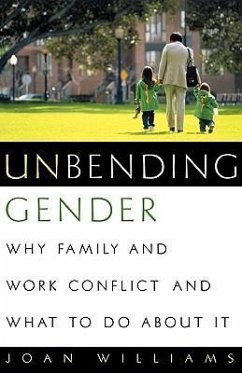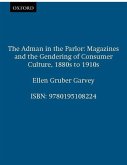The result is the impoverishment of women and children, who comprise the bulk of the poor in the United States. Unbending Gender questions the idea that women simply choose between staying at home with their children or going to work. Given the limited options that contemporary American culture allows them, mothers are forced to make compromises. Joan Williams' solution is an inclusive, family-friendly feminism that supports both mothers and fathers as caregivers and as workers.
In Unbending Gender, Joan Williams takes a hard look at the state of feminism in America. Concerned by what she finds--young women who flatly refuse to identify themselves as feminists and working-class and minority women who feel the movement hasn't addressed the issues that dominate their daily lives--she outlines a new vision of feminism that calls for workplaces focused on the needs of families and, in divorce cases, recognition of the value of family work and its impact on women's earning power. Williams shows that workplaces are designed around men's bodies and life patterns in ways that discriminate against women, and that the work/family system that results is terrible for men, worse for women, and worst of all for children. She proposes a set of practical policies and legal initiatives to reorganize the two realms of work in employment and households--so that men and women can lead healthier and more productive personal and work lives. Williams introduces a new 'reconstructive' feminism that places class, race, and gender conflicts among women at center stage. Her solution is an inclusive, family-friendly feminism that supports both mothers and fathers as caregivers and as workers.
Hinweis: Dieser Artikel kann nur an eine deutsche Lieferadresse ausgeliefert werden.
In Unbending Gender, Joan Williams takes a hard look at the state of feminism in America. Concerned by what she finds--young women who flatly refuse to identify themselves as feminists and working-class and minority women who feel the movement hasn't addressed the issues that dominate their daily lives--she outlines a new vision of feminism that calls for workplaces focused on the needs of families and, in divorce cases, recognition of the value of family work and its impact on women's earning power. Williams shows that workplaces are designed around men's bodies and life patterns in ways that discriminate against women, and that the work/family system that results is terrible for men, worse for women, and worst of all for children. She proposes a set of practical policies and legal initiatives to reorganize the two realms of work in employment and households--so that men and women can lead healthier and more productive personal and work lives. Williams introduces a new 'reconstructive' feminism that places class, race, and gender conflicts among women at center stage. Her solution is an inclusive, family-friendly feminism that supports both mothers and fathers as caregivers and as workers.
Hinweis: Dieser Artikel kann nur an eine deutsche Lieferadresse ausgeliefert werden.









